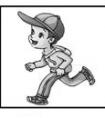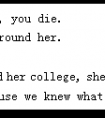用下面方框中单词的适当形式填入短文空格内,使短文意思正确、通顺(每词限用一次)。research common they fun before comparesudden social same findaffectexactWorried Th-九年级英语
题文
用下面方框中单词的适当形式填入短文空格内,使短文意思正确、通顺(每词限用一次)。
Imagine this situation. You pass a group of people. The people are talking to each other. You cannot hear what they are saying. But 1 they start laughing. What would you think? Would you think they were laughing at something 2 that one of them said? Or, to be honest with yourself, would you think they were laughing at you? Yes, you. Being laughed at is a 3 fear. But a major study published(公布)in 2009 found that this fear is not the 4 around the world, It differs from culture to culture. Some people in the study said they felt unsure of 5 in social situations and hid their feelings of insecurity (不安全). Others said they avoided (回避) social situations where they had been laughed at 6 . Shy people often avoid situations that would make them get into close contact (接触) with other people. They worry that something they say or do will make other people laugh at them, It can be truly sad for those who live with the fear of laughter. It can 7 how they lead their lives. In the study, a team from the University of Zurich led more than ninety 8 from around the world. They wanted to understand the difference between normal shyness and true fear of being laughed at. Another purpose of the study was 9 the levels of fear of being laughed at in different cultures. The scientists surveyed more than twenty-two thousand people in forty-two different languages. The 10 would appear in Scientific Humor. |
答案
小题1:suddenly 小题2:funny 小题3:common 小题4:same 小题5:themselves 小题6:before 小题7:affect 小题8:researchers 小题9:to compare 小题10:findings |
| 短文属于说明文。短文分析了“害怕被嘲笑”的恐怕心理,到底是因为普通的羞涩还是真的害怕被嘲笑,研究人员在做调查研究。 小题1:意思是:在说话时,突然开始大笑。此处需要一个副词。 小题2:“可笑的事”,形容词后置,修饰不定代词something。 小题3:用于a 和名词之间,使用形容词;common“普通的,平常的”。 小题4:the same“一样的”,与后句的“differs from…”相对应。 小题5:feel sure of oneself “有自信”,这里使用了sure的否定形式;主语是Shy people,因此使用they的反身代词themselves。 小题6:根据“they had been laughed at”可知用了过去完成时,是比说话时更早的事情,用before泛指以前。 小题7:情态动词can后,使用动词原形。 小题8:根据上下文可知这里指研究人员,用复数形式。 小题9:通过上一句“the difference between normal shyness and true fear of being laughed at.”可知,目的就是为了做比较。此处用动词不定式短语做表语。 小题10:这里指调查、研究的结果,用复数形式。 |
据专家权威分析,试题“用下面方框中单词的适当形式填入短文空格内,使短文意思正确、通..”主要考查你对 连词成句 等考点的理解。关于这些考点的“档案”如下:
连词成句
考点名称:连词成句
- 连词成句:
即是把错乱排列的词语根据语法或句法特点排列组合成为句式整齐,内容恰当,语气流畅的句子的方法。
他基本的要求是句子完整和流畅没有语法错误,更不要有语病。 连词成句题做题技巧:
首先强调第一个单词的第一个字母要大写,其次句子的最后要有标点符号。然后分句型来做:
1. 陈述句的时候,先找主语,然后找动词,再找其他,记得时间和地点是放在后面的。
2. 疑问句时,有疑问词的情况下找疑问词,然后找助动词,找主语,找其他。没有疑问词的情况下,就找助动词/be动词,再找主语,找其他。
3. 做这一类型的题目时,学生要有一定的基础,会认读单词,熟悉基本句型。
具体可以分一下几步来完成:
一、看清标点符号
1.如果是句号,则是陈述语句。陈述句的基本结构就是主语+谓语+宾语而构成的。
2.如果是问号,则是疑问语句。要先看是特殊疑问句还是由情态动词引导的疑问句。
①如果有where 、what、how等疑问词,那么它就是特殊疑问句,就要把疑问词where 、 what、 how 等放在一句话的最前面,它后面紧接的是be动词也就是我们学习过的am、is、are三个单词。
②如果题目中有can、 may、shall、would等情态动词,那么它就是由情态动词引导的疑问句。
例如:“have I a may new bike (?)” 。这道题目中有一个情态动词may,很显然这就是由情态动词may引导的疑问句。那么我们就要把may放在句子的最前面,后面紧接的就是这句话的主语(主语往往是人或者物)。
很快我们就能写出这句话的前半部分“May I have …”很显然,还剩下的几个单词可以构成一个词组“a new bike”,那么将整句话连起来就是“May I have a new bike ?”(我可以拥有一个新的自行车吗?)。
同样其他的句子,例如:由can 、would、shall等情态动词引导的句子也是这样的方法可以完成。
③如果题目中没有任何的特殊疑问词,也没有任何情态动词,那么它就是我们最最熟悉的一般疑问句了。
例如:“you a are student(?)”。很显然是一个疑问句,而且没有任何特殊疑问词。所以这是一句一般疑问句,一般疑问句的基本准则就是疑问词是be动词(am /is/are),而且要把它们放在句子的最前面。
通过观察我们看到题目中有一个be动词(are),所以这句话就很容易连到“Are you a student ?”(你是一个学生吗?)。
这样的题目还可以先将它当作一般陈述句来做,然后再由陈述句改成一般疑问句。
例如“you a are student(?)”这题还可以先将它写成一般陈述句的形式“You are a student.”。
然后将它写成一般疑问句,即是将这句话的主语和谓语(be动词)对调,得到“Are you a student?”,这样这句话也就完成了。
3.如果是感叹号,则是感叹语句。
①由what引导的感叹句。
我们知道有what引导的感叹句,其基本结构是What + a + adj. + n.。
例如:“What a nice book !”(多漂亮的一本书啊!)
② 由how引导的感叹句。
与what引导的感叹句相似,how引导的感叹句的结构是“How + adj.( +n. /名词短语 + be动词 )!”。二、注意特殊句型
还有一些连词成句的题目看上去似乎是无规律可循。
有这样一个题目:“to time to go it’s school (.)” 这样的题目就要求学生对有些句型的熟练掌握。
- 最新内容
- 相关内容
- 网友推荐
- 图文推荐
| [家长教育] 孩子为什么会和父母感情疏离? (2019-07-14) |
| [教师分享] 给远方姐姐的一封信 (2018-11-07) |
| [教师分享] 伸缩门 (2018-11-07) |
| [教师分享] 回家乡 (2018-11-07) |
| [教师分享] 是风味也是人间 (2018-11-07) |
| [教师分享] 一句格言的启示 (2018-11-07) |
| [教师分享] 无规矩不成方圆 (2018-11-07) |
| [教师分享] 第十届全国教育名家论坛有感(二) (2018-11-07) |
| [教师分享] 贪玩的小狗 (2018-11-07) |
| [教师分享] 未命名文章 (2018-11-07) |






